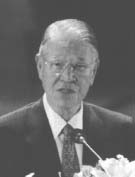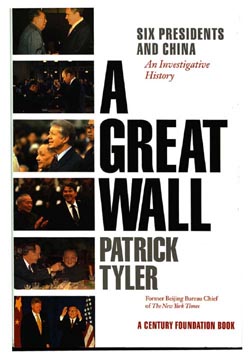 Taiwan
Communiqué No. 88, November 1999
Taiwan
Communiqué No. 88, November 1999 Taiwan
Communiqué No. 88, November 1999
Taiwan
Communiqué No. 88, November 1999 In spite of a continuing barrage of insults and threats from China, and
often not-so-subtle pressure from the Clinton Administration, President
Lee Teng-hui has refused to budge and has stuck to his "state-to-state"
pronouncement, made in an interview with German Die Welle
radio on 9 July 1999.
In spite of a continuing barrage of insults and threats from China, and
often not-so-subtle pressure from the Clinton Administration, President
Lee Teng-hui has refused to budge and has stuck to his "state-to-state"
pronouncement, made in an interview with German Die Welle
radio on 9 July 1999.
Most recently, Mr. Lee Teng-hui reiterated his statement in a message prepared for the Kuomintang's National Day on 10 October 1999. He said: "We deem the relationship between the two sides of the Taiwan Strait to be a special state-to-state relationship, which is a historical and legal fact."
During the past two months, a number of U.S. and international magazines and newspapers also published further articles supportive of what Mr. Lee had said. For an overview of articles during the first few weeks, see "Press debates the issues" in Taiwan Communiqué no. 87, pp. 6-8.
Below we present a brief summary of three of the most outstanding more recent commentaries.
In an article in the 6 September 1999 issue of Forbes Magazine, titled "Taiwan is the victim -- not the villain" former US Secretary of Defense Caspar Weinberger criticizes the Clinton Administration for its appeasement of Beijing, in particular following President Lee's July 9th statements. He compares the U.S. response to that of Neville Chaimberlain in 1938, who criticized Czechoslovakia for disagreeing with the Munich Pact _ which sold out their homeland to Hitler and Mussolini.
Mr. Weinberger discounts statements by the State Department which says it is acting "scrupulously neutral." Mr. Weinberger says that, to the contrary, the US is encouraging the PRC "in an extremely dangerous way."
He also expresses support for the Taiwan Security Enhancement Act, saying that it would clear up any misconceptions left by the Taiwan Relations Act and the so-called "Three Communiqués". He says it has become necessary because the Clinton Administration has time and again answered requests from Taiwan for defensive arms with excuses and delays.
Another interesting commentary was published in the Boston Globe on 12 September 1999. It was titled "Behind the China-Taiwan war on words", and written by W. Scott Thompson and his son Nicholas Thompson. The senior Thompson is professor at the Fletcher School of Law and Diplomacy at Tufts University, where he serves as director of the Southeast Asia Studies program.
The article referred to President Lee's "state-to-state" pronouncement, and says that "not since the little tyke declared that the emperor had no clothes was any more obvious fact laid bare."
The article says that among the many possible reasons for President Lee's statement, the most likely real reason is that he wanted to "…move Taiwan one notch up from the inappropriate isolation into which the international community, under Beijing's pressure, has pushed it." In the meantime, he (Lee himself) would function as a lightning rod for Chinese fulminations, but after he has left the scene after next year's elections, Taiwan and Beijing can negotiate on a new basis of relative equality.
The article states that the primary reason for Beijing's continuing attempts to isolate Taiwan are not that the island is the last bastion of the losing side of the Chinese Civil War, but the fact that Taiwan presents to the world (and to China) "…an embarrassing procession of successes."
The article states that "while we stand in awe of its culture, respect its economic achievements, and wish it the greatest success as a major power in international affairs, we do not condone the harassment of a small country…"
The article concludes by urging the leaders in China to accept Taiwan, to respect what the Taiwanese have accomplished, and to deal with Taiwan in the way London deals with Ottawa or Canberra. Then "…the world will have one less tinderbox to worry about."
Last, but certainly not least, in the series of commentaries on president Lee's remarks is an article titled "Beijing vs. Taipei", written by Ross Terrill of the Fairbank Center for East Asian Research at Harvard University, and published in The Weekly Standard, 23 August 1999.
Dr. Terrill writes that The United States has become locked into a "Beijing' flavored One-China policy based on a fiction. Once, it may have been a useful fiction. Now it has become a dangerous one." Dr. Terrill presents a historical perspective of the developments between Taiwan and China from the 1940s through the 1970s.
He says that at the time of the U.S. opening to China in the early 1970s, "Chiang Kai-shek's outlook and the political situation within Taiwan … lent credence to the Chinese Communists' view, making it plausible for countries that extended recognition to Beijing to settle for the One China concept." However, he argues that developments in Taiwan starting in the 1980s — in particular the coming of democracy in the '90s — have created a fresh context.
He states that "…the fiction of One-China has lost its credibility, and Lee's mode of coping with its erosion is reasonable." He also states that President Clinton's dealing with Taiwan has "proved inconstant". He writes that President Clinton "…is apparently unable to discern the difference between Washington's "acknowledging" in 1972 that "Chinese on both sides of the Taiwan Strait" saw Taiwan as part of China and Washington's "embracing a One-China policy," as he said it had done when he was in China in June 1998."
Dr. Terrill continues: "Equally, he failed to distinguish between avoiding support for Taiwan's recognition as a nation and standing in the way of such recognition. Or between leaving Taiwan's relationship with the PRC up to the two sides to work out, and himself declaring reunification to be the American agenda, as he did in his remarks at Beijing University. He needlessly breathed new life into Beijing's concept of One-China."
Dr. Terrill also strongly criticizes "some in Washington" for their "stunning failure to grasp the meaning of the transformation of the Taiwan issue in the 1990s."
Terrill goes on to quote Chas W. Freeman Jr.'s article in Foreign Affairs in 1998, and says: "To speak of a consensus on the "imperative" of achieving One-China is a piece of elitism that disregards a large segment of grass-roots sentiment in Taiwan. And it is simply false to say the United States has ever endorsed the "imperative" of reunification."
Dr. Terrill also strongly criticizes Chas Freeman's statement that "[N]o unilateral change in the status quo —precipitated by either side — is acceptable." Terrill asks: "But is there not a difference between a change in the status quo brought about by a military invasion — one of Beijing's ideas — and a change brought about by the will of the people expressed in free elections - which is what led to the new thinking in Taiwan?" (emphasis added _ Ed.)
Dr. Terrill then proposes a new U.S. policy, which is directly tied to the will of the people involved. He says that the U.S. should increasingly lean towards an acceptance of Taiwan's separateness as a fact of life. He argues that this policy would be compatible with supporting Taiwan's membership in a number of international organizations. He states that "…It is a victory for Beijing, with its relentless pressure for reunification, that Clinton officials are so quick to speak out of the merely "unofficial relations" between Washington and Taipei."
He concludes his article by stating that "…a Taiwan that was separate from China but non-hostile to it, as Finland was to the Soviet Union, or Panama is to the United States, could be in Beijing's interests." He also emphasizes that "…Washington's responsibility, given the Taiwan Relations Act, the high stakes of stability in East Asia, and our fundamental commitment to democracy, is to eschew ambiguity and make it crystal clear that a military move against Taiwan would be resisted by the United States. President Clinton should pick up the phone and say to President Jiang Zemin, in the words of President Reagan, that any attack by Beijing on Taiwan would damage U.S.-China relations beyond repair."

Anyone interested in finding out how U.S. policy towards Taiwan and China is really made, should read the new book, titled "A Great Wall, Six presidents and China, an investigative history", by New York Times correspondent Patrick Tyler.
The book describes in great detail how during the successive American administrations, Taiwan was betrayed and deceived by vain people in high places, whose main concern was "engagement" with China -- virtually at any cost.
First and foremost of the deceitful and betraying bunch was Henry Kissinger, who reportedly made a secret promise to Chou En-lai that the US "...did not seek two China's, or a one-China, one-Taiwan solution, nor did it seek an independent Taiwan" (bottom of p. 98). The bad thing is, that Clinton Administration officials referred back to this secret promise, when they attempted to defend Mr. Clinton's infamous "Three No" pronouncement of July 1998 in Shanghai.
Our counter-argument is, that a policy is only a nation's policy if it is 1) publicly stated, 2) decided on at the highest levels, and 3) discussed with, and agreed to by Congress. Mr. Kissinger's sinister maneuvering did not fulfill any of these criteria.
Another schemer who betrayed Taiwan was President Jimmy Carter's national Security adviser Zbigniew Brezinski. He pushed through the "normalization" of relations with China behind the back of the then-Secretary of State Cyrus Vance. His main purpose seemed to try to outmaneuver Vance.
Taiwan Communiqué comment: We urge the US Administration and the American people to learn from these fundamental mistakes, and to move towards a policy which accepts Taiwan as a full member in the international community and normalizes relations with our homeland.
Back to: Table of Contents
Copyright © 1999 Taiwan Communiqué